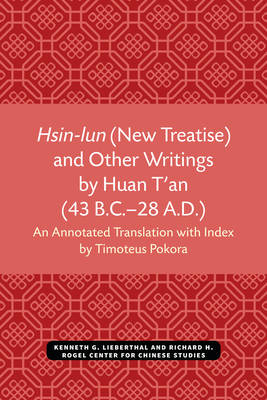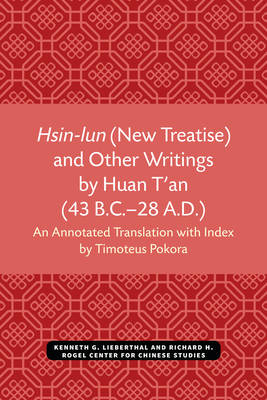
- Afhalen na 1 uur in een winkel met voorraad
- Gratis thuislevering in België vanaf € 30
- Ruim aanbod met 7 miljoen producten
- Afhalen na 1 uur in een winkel met voorraad
- Gratis thuislevering in België vanaf € 30
- Ruim aanbod met 7 miljoen producten
Zoeken
Hsin-lun (New Treatise) and Other Writings by Huan T'an (43 B.C.-28 A.D.)
Timoteus Pokora
€ 42,45
+ 84 punten
Omschrijving
Better known in his own times than later, Huan T'an (43 BCE-25 CE) was a scholar-official, independent in his thought and unafraid to criticize orthodox currents of his time. A practitioner of the Old Text exegesis of the Classics, he maintained a position on the court during a turbulent time of political crises, uprisings, and civil war, spanning the reigns of four emperors. His principal work, Hsin-lun, differs from other books on political criticism in that it does not deal primarily with history but takes many examples from contemporary social and political life. While belonging to the Old Text group of court officials and scholars, Huan T'an differed radically from them in his stress on direct knowledge, in his range of practical experience, and in his outspoken criticism of popular opinions. He was not a systematic philosopher, but his ideas were influential in the return to a more worldly conception of Confucianism. To translate Huan T'an's writings, one must reconstruct the texts. Timoteus Pokora uses two nineteenth-century fragments as a basis around which to orient quotations from Hsin-lun from sixty-four other sources, primarily encyclopedias and commentaries. Pokora provides notes to give context to these short references and to account for discrepancies between quotations and originals, and he includes a large index to add coherence and points of entry.
Specificaties
Betrokkenen
- Auteur(s):
- Uitgeverij:
Inhoud
- Aantal bladzijden:
- 414
- Taal:
- Engels
- Reeks:
Eigenschappen
- Productcode (EAN):
- 9780472038039
- Verschijningsdatum:
- 19/01/2021
- Uitvoering:
- Paperback
- Formaat:
- Trade paperback (VS)
- Afmetingen:
- 152 mm x 229 mm
- Gewicht:
- 680 g

Alleen bij Standaard Boekhandel
+ 84 punten op je klantenkaart van Standaard Boekhandel
Beoordelingen
We publiceren alleen reviews die voldoen aan de voorwaarden voor reviews. Bekijk onze voorwaarden voor reviews.











